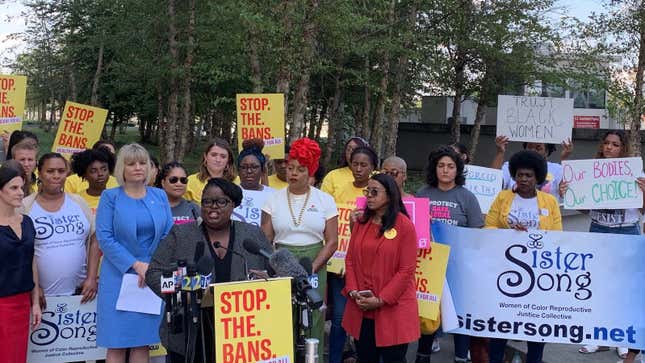'We're Not Playing Games': SisterSong's Monica Simpson On a New Legal Challenge to Georgia's Abortion Ban
JusticePolitics

Last week, the American Civil Liberties Union, Planned Parenthood, and the Center for Reproductive Rights filed a federal lawsuit against Georgia Governor Brian Kemp challenging the constitutionality of HB 481, which effectively bans abortion after six weeks, before most people know they are pregnant. (It is scheduled to go into effect on January 1; similar bills in Alabama and Indiana have been struck down, and a Missouri bill has been temporarily stayed.)
SisterSong v. Kemp—which names the long-running Atlanta group SisterSong Women of Color Justice Collective as its lead plaintiff along with nine service providers and individual doctors—is a powerful document (embedded in full below). Rooted in the language of reproductive justice, the suit outlines in plain terms the way the Georgia ban will affect the lives of the most vulnerable—low-income Georgians, Georgians of color, and rural Georgians in particular. By explicitly citing these people and the instances in which they might find themselves in the position to seek an abortion, SisterSong v. Kemp centers and focuses abortion access as a specific issue of class and race. The language of the suit also clarifies that it is using “women” as a shorthand, but that it includes “people of all gender identities”—and leverages the grassroots work the organization has been doing for 20 years advocating for people of color and other marginalized folks.
From the suit:
As SisterSong represents the needs and rights of the most oppressed communities, absent an injunction, H.B. 481 would force SisterSong to divert its scarce time and resources away from other aspects of its crucial work to help Georgians access abortion care out of state and otherwise adjust to H.B. 481’s sweeping impact. SisterSong is already fielding inquiries from Georgians panicked about obtaining abortions because of H.B. 481. Its members are among the people who would be most devastated were H.B. 481 to take effect.
It was also about the impact this type of legislation has on the whole life of individuals.
A few hours after the suit was filed Friday, Jezebel spoke by phone with Monica Simpson, the executive director of SisterSong, about the organization’s involvement in the legal challenge. At a press conference held that morning, she said that her organization’s involvement was, in part, “making it clear that our organized resistance is going to win. It is our duty to win.” On our call, she further emphasized her determination to protect the reproductive rights of Georgians, and acknowledged the magnitude of the filing. “I do think that it says a lot,” she said, “for an advocacy organization—in particular a black women-led advocacy organization—to take on this level of pushback and resistance.”
Our conversation has been lightly condensed and edited for clarity.
JEZEBEL: SisterSong v. Kemp—even the name of the suit feels impactful and representative of where how far you as an organization have come. How did you put it together with the ACLU, and how did the language within come about? It is very direct and powerful.
MONICA SIMPSON: We were fighting House Bill 481 at the state legislature, we got to the point that it was passed, we got to the point that it was signed into law, and all along this way—as an organization and part of a larger coalition of organizations—we had to use every strategy, including a legal strategy. We took our time to really think about what that meant for us as an organization to be prepared to take on that level of leadership, and also putting ourselves on a different terrain, so to speak, from a legal perspective.
We also thought about what it meant as an advocacy organization, because a lot of these legal cases around abortion access are [taken up by] service providers. This is no diss to service providers, but we take on movement-building work and organizing work in our everyday work, helping to harness the power of people on the ground and to be moving them toward these issues and to be activated around them. So I think it says a lot for an advocacy organization to put themselves out there in this way.
We were really able to lean on the ACLU a lot, and I think they really leaned on us about language, and how do we really want to talk about this? How did we want to frame this particular lawsuit? We were consulted and brought into the process in a way that really did feel like we were a team moving this thing forward. We were really able to make sure that our voice was presented how we wanted it to be, and move forward very much in line with our values.
-

-

-

-

-

-

-

-

-

-

-

-

-

-

-

-

-

-

-

-

-

-

-

-

-

-

-

-

-

-

-

-

-

-

-

-

-

-

-

-








































